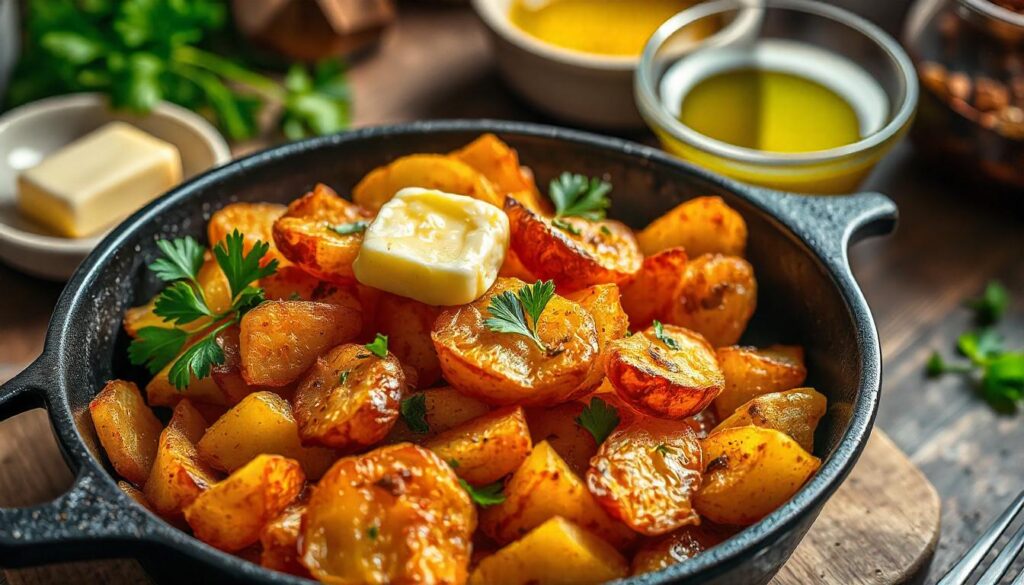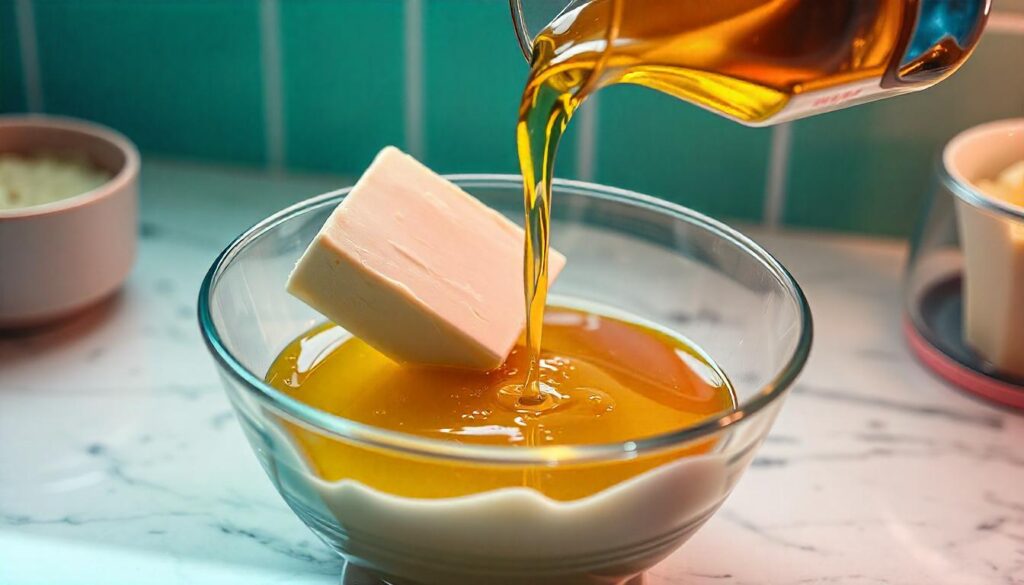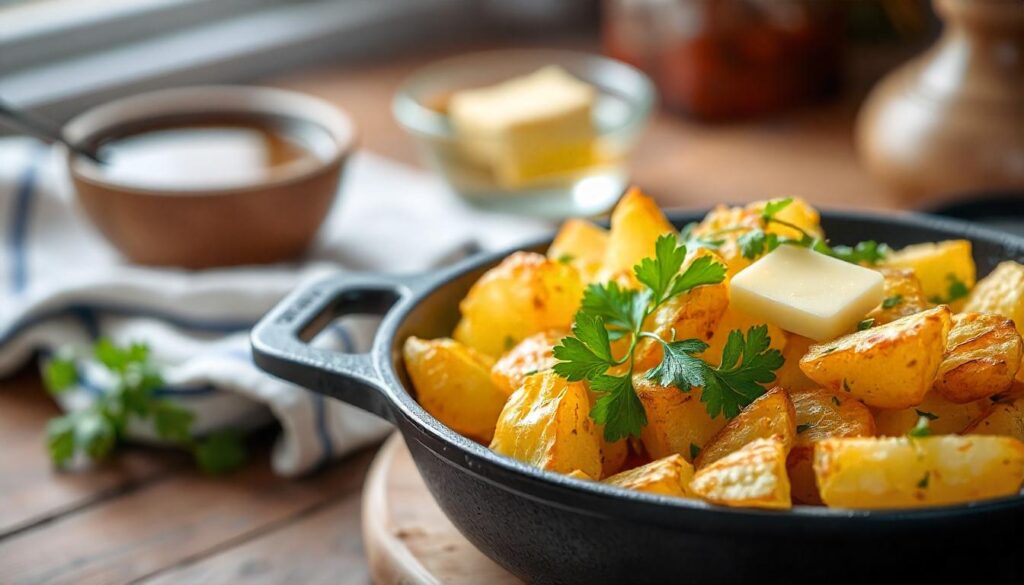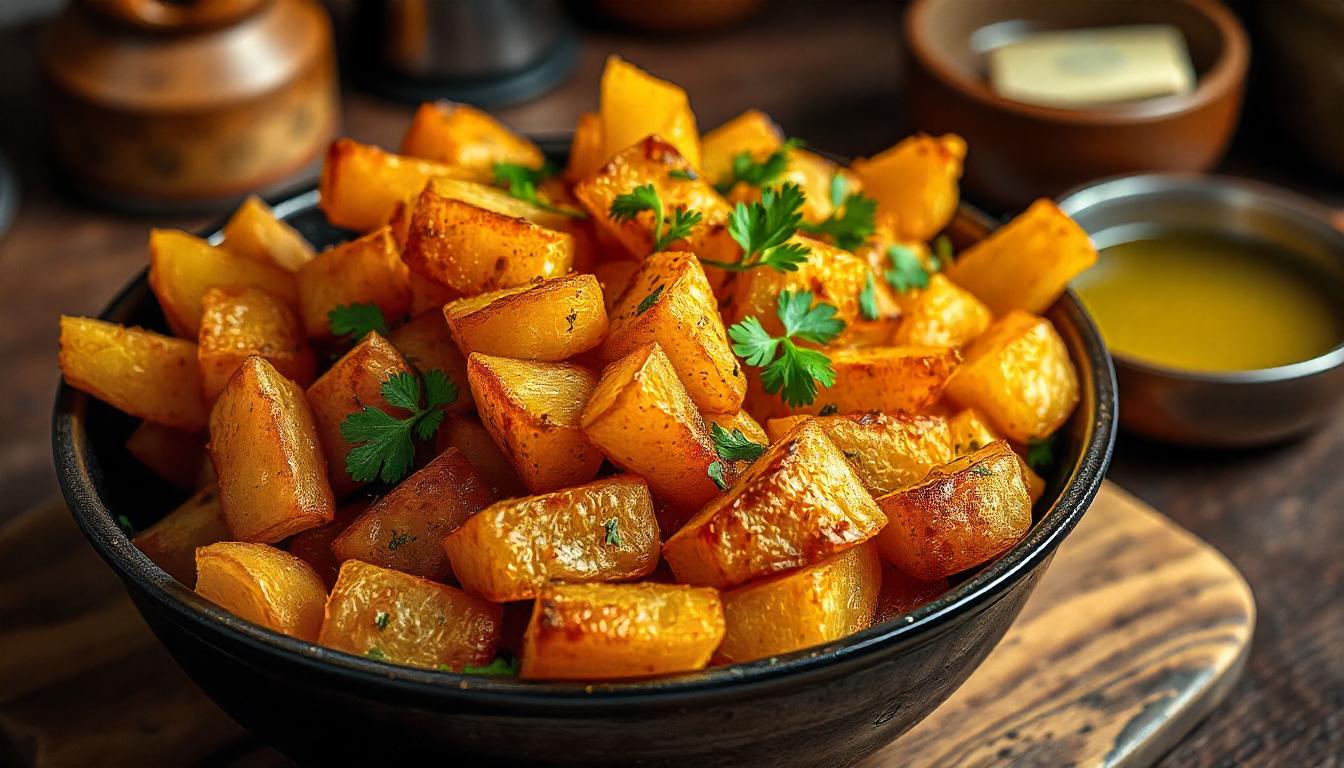Butter vs Oil: Which Is Better for Frying Potatoes? Frying potatoes is one of the simplest yet most satisfying cooking techniques. However, when it comes to choosing the perfect fat for frying—butter or oil—the decision is far from simple. The choice can significantly affect the flavor, texture, and even nutritional value of your fried potatoes. This article delves deep into the science, techniques, and best practices for frying potatoes in butter, oil, or a combination of both.

Table of Contents
Butter vs. Oil: Understanding the Basics
When considering whether to fry potatoes in butter or oil, it’s important to understand what makes these fats unique. Butter, derived from milk or cream, is prized for its rich, nutty flavor. It creates a beautiful golden crust on potatoes and enhances their natural sweetness. However, butter has a low smoke point of 350°F (177°C). This means it can burn quickly, leaving a bitter taste and potentially ruining your dish.
Conversely, oils such as canola, sunflower, or peanut oil are known for their higher smoke points, which can range between 400°F and 450°F (204°C to 232°C). These oils allow for frying at higher temperatures, creating a crispy, golden finish. While oil lacks the distinct flavor of butter, its neutral profile makes it a versatile option for various cooking styles.
To get a better grasp of how these fats interact with food, you can explore why fried potatoes sometimes fail to get crispy for tips on improving your frying technique.
The Science of Frying Potatoes
Achieving the perfect fried potato isn’t just about choosing butter or oil—it’s about understanding the science of frying. The process hinges on the Maillard reaction, a chemical process that occurs when food is cooked at high temperatures. This reaction is responsible for the crispy texture and rich, caramelized flavor that make fried potatoes so irresistible.
Butter’s milk solids contribute to the Maillard reaction, enhancing the potatoes’ flavor and color. However, these same milk solids are what cause butter to burn at lower temperatures. Oils, by contrast, can maintain consistent high heat, which is essential for achieving a perfectly crisp exterior without overcooking the interior.
For more detailed insights on this topic, consider reading how frying potatoes with onions can transform the taste.
Why Fry Potatoes in Butter?
Butter is a favorite among many home cooks and chefs for its unmatched flavor profile. Here are the top reasons why frying potatoes in butter can elevate your dish:
1. Flavor Enhancement
Butter imparts a rich, nutty flavor that enhances the natural taste of potatoes. The caramelization of the butter’s milk solids creates a depth of flavor that oil simply cannot replicate.
2. Golden Brown Crust
Cooking potatoes in butter results in a visually appealing golden-brown crust. This not only makes the dish look more appetizing but also adds a satisfying texture.
3. Versatility in Low-Heat Cooking
While butter is not ideal for high-heat frying, it excels in low- to medium-heat applications. This makes it perfect for sautéing potatoes or cooking them in a skillet over moderate heat.
Tips for Frying with Butter
- Use clarified butter or ghee, which has a higher smoke point, for better heat resistance.
- Combine butter with a small amount of oil to stabilize it during cooking.
- Cook over medium heat to prevent burning and stir frequently for even browning.
Why Fry Potatoes in Oil?
While butter is prized for its flavor, oils bring their own set of advantages to the table. Here’s why frying potatoes in oil might be the better choice for some cooks:
1. Higher Smoke Point
Oils like canola, peanut, or sunflower oil have a higher smoke point, allowing for frying at higher temperatures. This is crucial for creating crispy potatoes without burning.
2. Neutral Flavor
Oils tend to have a more neutral flavor compared to butter. This allows the natural taste of the potatoes to shine, making oil a better choice for dishes that rely on bold seasonings or additional flavors.
3. Healthier Fat Profile
Oils, especially those high in unsaturated fats, are often considered healthier than butter. For example, olive oil contains heart-healthy monounsaturated fats, while avocado oil is rich in antioxidants.
Tips for Frying with Oil
- Choose oils with a smoke point above 400°F (204°C) for best results.
- Preheat the oil before adding potatoes to ensure even cooking.
- Drain excess oil using paper towels to reduce greasiness.
To further optimize your frying process, consider whether boiling potatoes before frying is necessary for achieving the perfect texture.
The Best of Both Worlds: Combining Butter and Oil
For those who want the flavorful richness of butter and the heat stability of oil, combining the two is an excellent solution. This method is popular among chefs and home cooks alike.
Why Combine Butter and Oil?
- Flavor and Crispiness: The butter adds depth of flavor, while the oil ensures a crispy exterior.
- Higher Heat Tolerance: Adding oil raises the butter’s smoke point, allowing for cooking at slightly higher temperatures without burning.
- Balanced Results: You get the best of both worlds—a dish that is flavorful, crispy, and perfectly cooked.

How to Combine Butter and Oil
- Heat oil in a skillet first, as it has a higher smoke point.
- Once the oil is hot, add butter to the pan.
- Fry the potatoes over medium heat, stirring occasionally to ensure even cooking.
Common Mistakes to Avoid
To ensure your potatoes turn out perfectly, here are some common frying mistakes to avoid:
- Overcrowding the Pan: This causes steaming instead of frying, resulting in soggy potatoes.
- Skipping the Drying Step: Wet potatoes can cause oil splatters and uneven cooking.
- Using the Wrong Heat: Too low a heat prevents crisping, while too high a heat burns the butter or overcooks the exterior.
FAQs About Frying Potatoes
Can You Fry Potatoes in Just Butter?
Yes, but it’s best to use low to medium heat and stir frequently to prevent burning.
Which Oil Is Best for Frying Potatoes?
Oils with high smoke points, such as peanut or avocado oil, are ideal for frying potatoes.
Does Mixing Butter and Oil Enhance the Flavor?
Absolutely! Combining the two gives you the rich flavor of butter and the heat tolerance of oil.
Should You Boil Potatoes Before Frying?
Boiling potatoes beforehand can help achieve a tender interior and crispy exterior. However, it’s not always necessary and depends on your desired outcome.
Conclusion
So, is it better to fry potatoes in butter or oil? The answer depends on your priorities. If you’re after rich, buttery flavor, butter is the clear winner. If you’re looking for crispiness and high-heat performance, oil is the better choice. Better yet, combine the two for the ultimate frying experience.

For more tips and tricks, you might want to explore how to fry potatoes without boiling them. Whichever method you choose, your fried potatoes are sure to be a hit!

